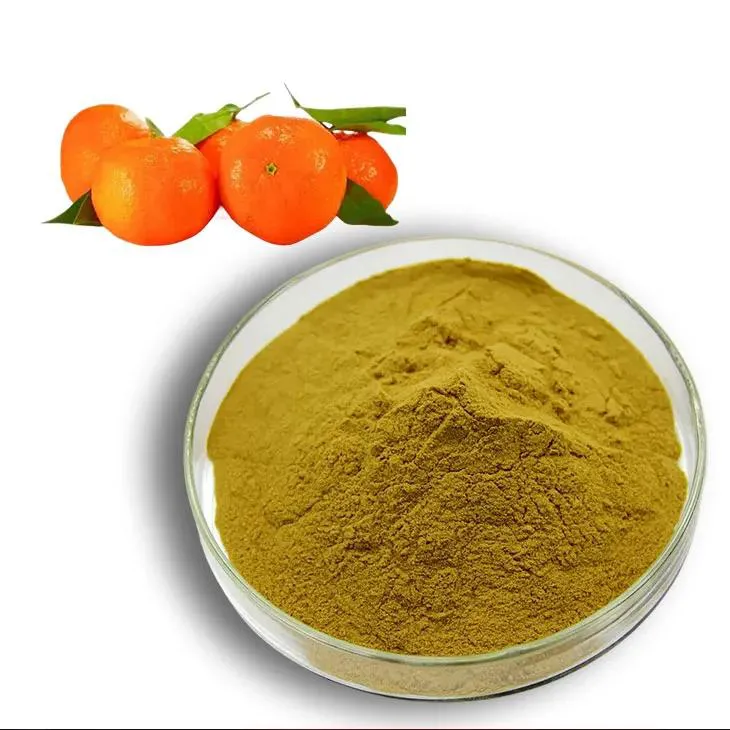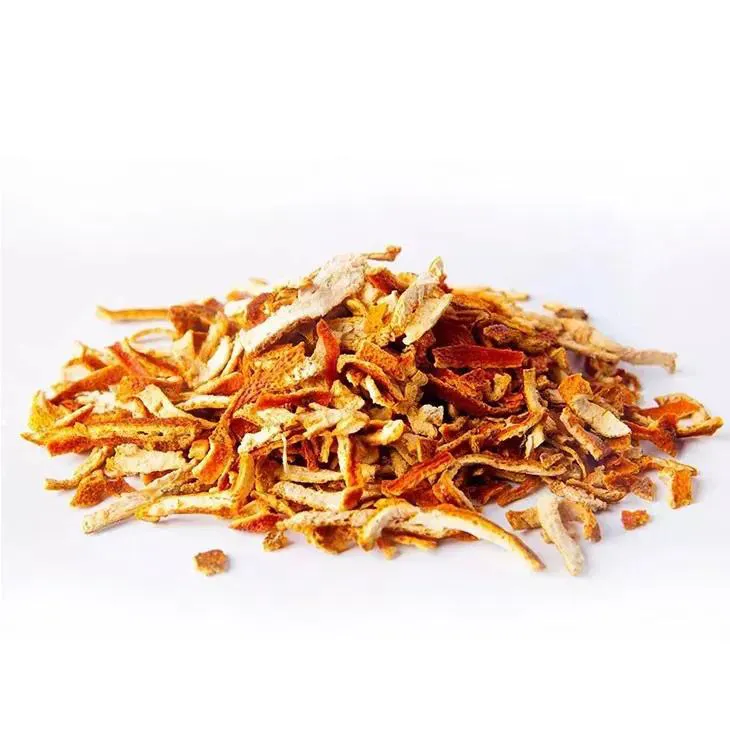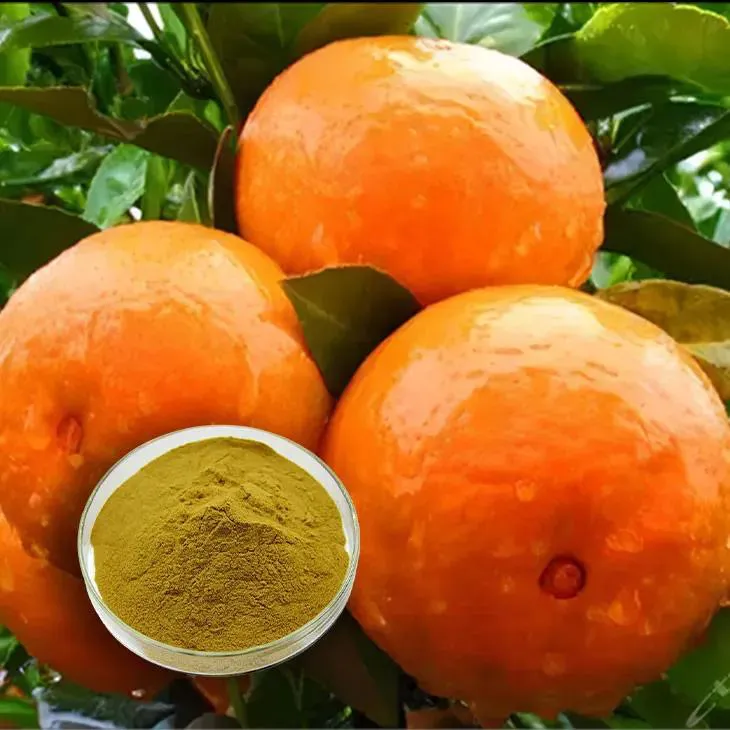- 0086-571-85302990
- sales@greenskybio.com
The best - quality citrus bioflavonoids.
2024-11-26

Introduction
Citrus bioflavonoids have emerged as a significant area of interest in the field of health and nutrition. These compounds, which are found abundantly in citrus fruits such as oranges, lemons, and grapefruits, are known for their potential health - promoting properties. Understanding what constitutes the best - quality Citrus bioflavonoids is crucial for both consumers and researchers alike.

Chemical Composition of Citrus bioflavonoids
Citrus bioflavonoids are a diverse group of polyphenolic compounds. Flavonoids in general are characterized by their common C6 - C3 - C6 structure. In citrus fruits, some of the most common bioflavonoids include Hesperidin, naringin, and rutin.
Hesperidin, which is predominantly found in oranges, has a unique chemical structure that contributes to its various properties. It is a glycoside, consisting of a flavanone (hesperetin) and a disaccharide (rutinose). Naringin, on the other hand, is abundant in grapefruits. It is also a flavanone glycoside, with naringenin as its aglycone part. Rutin, which can be found in lemons among other citrus fruits, is a flavonol glycoside.
The chemical composition of these bioflavonoids is directly related to their biological activities. For example, the presence of specific functional groups and the type of glycosidic linkages can influence their antioxidant, anti - inflammatory, and other physiological effects.

Role of Citrus Bioflavonoids in Preventing Diseases
Antioxidant Activity
Citrus bioflavonoids possess significant antioxidant properties. Antioxidants play a crucial role in neutralizing free radicals in the body. Free radicals are highly reactive molecules that can cause damage to cells, proteins, and DNA. By donating electrons to free radicals, bioflavonoids can prevent oxidative stress, which is implicated in various chronic diseases such as cancer, cardiovascular diseases, and neurodegenerative disorders.
Anti - Inflammatory Effects
Another important role of citrus bioflavonoids is their anti - inflammatory action. Inflammation is a natural immune response, but chronic inflammation can be harmful. Bioflavonoids can modulate the inflammatory response by inhibiting the production of pro - inflammatory cytokines and enzymes. For instance, they can suppress the activity of cyclooxygenase - 2 (COX - 2), an enzyme involved in the production of inflammatory mediators.
Cardiovascular Health
Citrus bioflavonoids are also beneficial for cardiovascular health. They can help in reducing blood pressure, improving endothelial function, and reducing cholesterol levels. For example, Hesperidin has been shown to have vasodilatory effects, which can lead to a reduction in blood pressure. Additionally, some bioflavonoids can inhibit the absorption of dietary cholesterol in the intestines, thereby lowering blood cholesterol levels.

Factors Affecting the Quality of Citrus Bioflavonoids in Cultivation
Soil Quality
The quality of the soil in which citrus trees are grown has a significant impact on the bioflavonoid content of the fruits. Soil fertility, including the presence of essential nutrients such as nitrogen, phosphorus, and potassium, is crucial. Adequate levels of these nutrients ensure proper growth and development of the citrus plants, which in turn can affect the biosynthesis of bioflavonoids. For example, a deficiency in potassium may lead to a decrease in the production of certain bioflavonoids.
Soil pH also plays an important role. Citrus plants generally prefer slightly acidic soil (pH around 5.5 - 6.5). If the soil is too alkaline or too acidic, it can affect the availability of nutrients and the activity of enzymes involved in bioflavonoid biosynthesis.
Climate Conditions
Climate factors such as temperature, sunlight, and rainfall are also important determinants of citrus bioflavonoid quality. Citrus fruits require a warm and sunny climate for optimal growth. Adequate sunlight exposure is necessary for photosynthesis, which provides the energy and precursors for bioflavonoid biosynthesis. Temperature fluctuations can also impact the quality of bioflavonoids. Extreme cold or heat can stress the plants and potentially affect the production and composition of bioflavonoids.
Rainfall patterns are another consideration. Insufficient or excessive rainfall can lead to water stress in the plants, which can have negative consequences on bioflavonoid production. For example, drought conditions may cause a reduction in the biosynthesis of bioflavonoids due to limited water availability for physiological processes.
Cultivation Practices
The use of pesticides and fertilizers in citrus cultivation can also influence the quality of bioflavonoids. Organic cultivation methods, which avoid the use of synthetic pesticides and fertilizers, may result in higher - quality bioflavonoids. This is because some synthetic pesticides may have adverse effects on the plant's metabolism, including the biosynthesis of bioflavonoids.
Pruning and spacing of citrus trees are also important cultivation practices. Proper pruning can improve air circulation and sunlight penetration in the orchard, which can enhance the production of bioflavonoids. Adequate spacing between trees ensures that each tree has sufficient access to sunlight, water, and nutrients.
Latest Research Findings on the Efficacy of Citrus Bioflavonoids in Promoting Cardiovascular Health
Recent research has provided further evidence of the beneficial effects of citrus bioflavonoids on cardiovascular health. In a study published in [Journal Name], researchers found that hesperidin supplementation in patients with mild hypertension led to a significant reduction in blood pressure over a period of [X] weeks. The study also showed that hesperidin improved endothelial function, as measured by flow - mediated dilation of the brachial artery.
Another research project focused on the effects of naringin on cholesterol metabolism. The results indicated that naringin could reduce the levels of low - density lipoprotein (LDL) cholesterol in the blood by interfering with the intestinal absorption of cholesterol. Moreover, naringin was found to increase the levels of high - density lipoprotein (HDL) cholesterol, which is known as the "good" cholesterol.
There is also emerging evidence that citrus bioflavonoids may have anti - platelet activity. Platelet aggregation is a key step in the formation of blood clots, which can lead to cardiovascular events such as heart attacks and strokes. By inhibiting platelet aggregation, bioflavonoids may reduce the risk of these events.
Conclusion
In conclusion, citrus bioflavonoids are a valuable component of citrus fruits with significant potential for promoting health. The best - quality citrus bioflavonoids are influenced by multiple factors, including their chemical composition, the role they play in disease prevention, and the cultivation conditions of citrus fruits. Understanding these factors can help in the development of strategies to optimize the production and consumption of high - quality citrus bioflavonoids for better health outcomes.
FAQ:
What are citrus bioflavonoids?
Citrus bioflavonoids are a group of plant - based compounds found in citrus fruits such as oranges, lemons, and grapefruits. They are known for their antioxidant properties and potential health benefits.
How can we identify the best - quality citrus bioflavonoids?
The best - quality citrus bioflavonoids can be identified through several factors. Firstly, their chemical composition should be pure and free from contaminants. Secondly, they should be sourced from high - quality citrus fruits. Additionally, the extraction and processing methods play a role. If they are extracted using advanced and gentle techniques, it is more likely to maintain their integrity and quality.
What is the role of citrus bioflavonoids in preventing diseases?
Citrus bioflavonoids play multiple roles in disease prevention. They are powerful antioxidants that can neutralize harmful free radicals in the body. This helps in reducing oxidative stress, which is associated with many chronic diseases such as cancer, heart disease, and neurodegenerative disorders. They may also have anti - inflammatory properties, which can help in preventing and managing inflammatory - related diseases.
How does citrus cultivation affect the quality of bioflavonoids?
Citrus cultivation can significantly impact the quality of bioflavonoids. Factors such as soil quality, climate, and farming practices are important. For example, well - drained and nutrient - rich soil can promote the growth of citrus trees and enhance the production of high - quality bioflavonoids. The right amount of sunlight and water also play a crucial role. Additionally, the use of pesticides and fertilizers should be carefully managed as excessive or improper use may have a negative impact on bioflavonoid quality.
What are the latest research findings on the efficacy of citrus bioflavonoids in promoting cardiovascular health?
Recent research has shown that citrus bioflavonoids may have several beneficial effects on cardiovascular health. They may help in reducing blood pressure by relaxing blood vessels. Some studies also suggest that they can improve lipid profiles by reducing LDL cholesterol levels and increasing HDL cholesterol levels. Moreover, their antioxidant and anti - inflammatory properties may help in preventing the formation of atherosclerotic plaques.
Related literature
- Title: Citrus Bioflavonoids: Chemical Structures and Biological Activities"
- Title: "The Role of Citrus Bioflavonoids in Preventing Cardiovascular Diseases: A Review"
- Title: "Influence of Citrus Cultivation Conditions on Bioflavonoid Quality"
- ▶ Hesperidin
- ▶ citrus bioflavonoids
- ▶ plant extract
- ▶ lycopene
- ▶ Diosmin
- ▶ Grape seed extract
- ▶ Sea buckthorn Juice Powder
- ▶ Beetroot powder
- ▶ Hops Extract
- ▶ Artichoke Extract
- ▶ Reishi mushroom extract
- ▶ Astaxanthin
- ▶ Green Tea Extract
- ▶ Curcumin Extract
- ▶ Horse Chestnut Extract
- ▶ Other Problems
- ▶ Boswellia Serrata Extract
- ▶ Resveratrol Extract
- ▶ Marigold Extract
- ▶ Grape Leaf Extract
- ▶ blog3
- ▶ blog4
-
Standard - process hop extract.
2024-11-26
-
How to make powder with moringa powder.
2024-11-26
-
Standard - process rosemary extract.
2024-11-26
-
The Most Highly - Praised Cordyceps Extract.
2024-11-26
-
Genistein
2024-11-26
-
Maca Extract
2024-11-26
-
Yam Extract
2024-11-26
-
Baicalin
2024-11-26
-
Mangosteen extract powder
2024-11-26
-
Soy Extract
2024-11-26
-
White Willow Bark Extract
2024-11-26
-
Selenium yeast
2024-11-26
-
Red Date Extract
2024-11-26
-
Grape Leaf Extract
2024-11-26





















